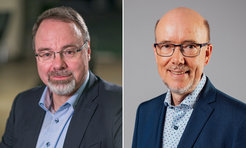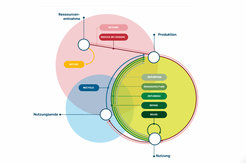"Preserving value must become more appealing than discarding it”
What makes a truly circular economy so difficult to achieve – technically, economically, and socially? Kai Sundmacher, Director at the Max Planck Institute for Dynamics of Complex Technical Systems, and Dietmar Harhoff, Director at the Max Planck Institute for Innovation and Competition, share their insights in a joint interview. They discuss the incentives we need, the importance of durable products, and how even small decisions can drive big change.
What makes a truly circular economy so difficult to achieve – technically, economically, and socially?
Kai Sundmacher, Director at the Max Planck Institute for Dynamics of Complex Technical Systems, and Dietmar Harhoff, Director at the Max Planck Institute for Innovation and Competition, share their insights in a joint interview. They discuss the incentives we need, the importance of durable products, and how even small decisions can drive big change.

Kai Sundmacher, Mr Sundmacher, Mr Harhoff, what are you currently researching — and how did the circular economy become part of your work?
Kai Sundmacher: I'm fascinated by new technical processes and the physical and chemical principles behind them. To make a circular economy work efficiently, we need to explore and better understand these fundamentals. In my department, we're currently researching how to close carbon cycles — for example, by chemically recycling plastic waste or using biogenic residues. Our goal is to help transform the chemical industry into a sustainable production system.
Dietmar Harhoff: I’ve long been interested in how innovation works: where do new ideas come from? How do they make it into practice? And what incentives help that process? This is key for the circular economy — because it's not just about new technologies, but also about viable business models. Part of our mission is to ensure that researchers like Kai Sundmacher have the best possible conditions to develop innovations.
The circular economy is a much-used term. What does it mean from your point of view?
Sundmacher: At its core, it’s about conserving resources, designing products to last longer, and closing material loops — rather than burning or dumping waste that could be reused as raw material. We talk about the R-strategies (editor’s note: see graphic), which require rethinking every stage of a product’s life cycle.
Harhoff: And about the right incentives. As long as it is cheaper to use newly extracted raw materials than to recycle old ones, little will change. How can sufficient funds be made available to promote technical innovations, which form the basis of these cycles? And how can we encourage economic players to extend the lifespan of products? In short, how can we reorganise our system so that retaining value becomes more attractive than throwing it away? This is very complex.

Why is it so difficult?
The barriers are everywhere. Consumers are hard to predict, and our current economic system wasn’t built for closed loops. It resists change. Creating new incentives, changing behaviour patterns, dissuading producers from using raw materials in ways that are strongly driven by consumption – these are all major hurdles.
Sundmacher: Today’s market hardly rewards long-lasting products. Instead, the trend is to buy a new mobile phone as soon as the next generation comes out. This creates more and more electronic waste. Our system is self-reinforcing – it’s almost designed to accelerate consumption and waste. But we have now reached our limits: we can feel it everywhere. We can't go on like this.
How are you tackling this with your research, Mr Sundmacher?
Sundmacher: We're working on replacing fossil carbon entirely with renewable, so-called "green", carbon sources – for example through plastic waste, biogenic residues from agriculture and food production, or through the use of CO₂. But using CO₂ is energy-intensive. We therefore need new processes that use as little renewable energy as possible when utilising green carbon sources. Ideally, we could recover carbon-containing substances directly from existing products without chemically converting them too much – for example, reusing polyamide fibres from textiles for polyamide-containing products without detouring via incineration, and capturing the CO₂ produced in the process. It's technically demanding, but in principle, it's possible.
And economically – how are such ideas put into practice?
Harhoff: Max Planck research can be transferred in various ways – for example, through licensing to large companies or, increasingly, through start-ups testing new technologies. This is risky: only about 20 percent of these start-up attempts are successful, but without these trials, progress would stall. We also support start-ups in the Max Planck Society through initiatives like the MAX!mize programme, which helps scientists turn their ideas into viable business models.
And what about the right framework conditions in Germany?
Harhoff: We are definitely seeing positive developments, such as the National Circular Economy Strategy. Many approaches are now also coming from the European Commission – for example, with its directive encouraging repairs for electronic devices. But many factors are still missing – such as more consistent CO₂ pricing or stronger innovation support for the circular economy. Transitions are painful. Economically weaker players, in particular, fear that they will not be able to keep up. But we have to shape the transformation, and that also means providing financing instruments for the transition. Our task as researchers is to propose scientifically sound regulatory and funding models and to discuss them with the stakeholders.
You mentioned the “pain of adjustment.” Have you made changes in your own lives?
Sundmacher: I’ve installed solar panels on our house – a logical step for me to use renewable energy in my everyday life. I've also rethought my diet, not least because of my daughters, who are vegetarian and vegan. A plant-based diet has a huge climate benefit, as many studies show. And a circular economy only works if our lifestyle also becomes more economical: less energy use, less resource consumption. Just making everything "green" is not enough; we also need to reduce consumption overall.
Harhoff: We have also retrofitted a solar system at home. At the same time, this brings me directly into an internal conflict of objectives: I drive an old W124 – it’s 35 years old, with a six-cylinder combustion engine. An electric car will have to come along soon. And such conflicting goals also exist in everyday research. How long should I use my laptop before replacing it? Mine is seven years old, and the keyboard just broke. Of course, this can't be a general example: many of my colleagues who rely on high computing power often need the latest generation of computers. But we should be asking these questions, even in the day-to-day running of the institute. Because many of these decisions, no matter how small they seem, have an impact. Changing behaviour is one of the biggest challenges – and it affects us all, both professionally and privately.
What do you expect from the panel discussion at the MPG's plenary assembly on 25 June in Magdeburg?
Harhoff: I hope for an honest discussion – especially on the issue of behavioural change. That can quickly become uncomfortable, but we can't avoid it. I agree with Mr Sundmacher's assessment: our way of life has to change. How can we find a social consensus on this issue? We don't want to control nutritional decisions by law. If someone wants to eat meat every day, that is a personal decision. But those who cause social costs should also bear some responsibility.
Sundmacher: I'm looking forward to the exchange – also because we bring different perspectives that complement each other well. Mr Harhoff looks at the economic and social framework conditions, while I focus more on the technical processes. At the Max Planck Society in particular, we have the rare opportunity to bridge these fields. The challenges of a circular economy can only be tackled together – technically, economically, and socially. I see great potential for cross-disciplinary cooperation. The MPG offers a very good framework for this. And perhaps this panel discussion will be a prelude to thinking ahead with new ideas in networks.
The interview was conducted by Petra Maaß.

